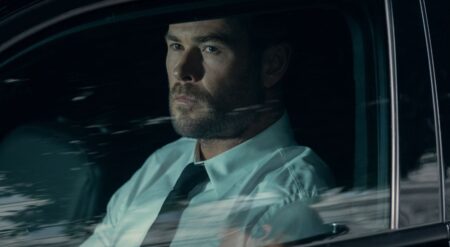While many know Decision to Leave‘s iconic director Park Chan-wook for his Vengeance Trilogy (a trilogy that deserves any and all recognition for sure), my favorites of his work are those centered around romance. This is true for the vampire film Thirst and the candy-colored take on romance in a mental facility, I’m A Cyborg But That’s Okay.
In capturing the romance, Park can capture the beauty yes, but also the melancholy that often underscores it, and ultimately the way love transforms us. In a bleak story filled with yearning as much as intrigue, Park manages to peel back thin layers of emotion, intimately investigating the things we do for love. Directed by Park, the film is written by Park and Jeong Seo-kyeong.
Decision to Leave is both a perfect romance and a perfect detective story, with both ends of it held together with a thread of obsession. In it, Hae-jun is one of Busan’s top detectives. He’s good at what he does and the obsession with his cases that push his insomnia is as much a part of his success with catching killers as it is a hindrance to his personal life.
When a dead hiker is found at the base of a mountain he summited, Hae-jun and his team begin to investigate it to see if foul play is involved or if it was all just an accident. When the hiker’s Chinese wife Seo-rae is questioned, her lack of visible grief and almost joy at his passing sends Hae-jun down a rabbit hole searching for the truth.
Director Park is a master at using explicit moments. Intense violence and sex are common in some of his most prolific series. However, Decision to Leave is stripped down to two actors, one case, and a mountain of things left unsaid that push the narrative’s ripples just below the surface.

Told implicitly through word choices, using lip balm, and cooking food, Hae-jun and Seo-rae have an emotional affair. One is not reliant on physical intimacy but so intoxicatingly heavy that the two begin to act as one. However, throughout the film, Park casts doubt on the romance. Choices throw bonds into question, and yet, as if inevitably, the two people are pulled tighter together.
Decision to Leave may be slow, but it is heavy and bleak in the way only unsolved crimes and unresolved romances can be. This isn’t a torrid affair. It’s a slow-burning one that is only acted on in the last moments. And somehow, despite avoiding the lustful actions often associated with obsessive romances, Park manages to tell a story that feels as bottomless. The two can pull each other down deeper, they can break each other further, and even at the romance’s end, it still exists.
Park Hae-il and Tang Wei in the lead roles of Hae-Jun and Seo-rae, respectively, are so well-matched on screen that you can see electricity spark between them immediately. They bounce off for each other and change each other so deeply, and do so with overflowing chemistry. That said, their greatest moments on screen are also their smallest. In the film’s first act, Park inserts Hae-jun into moments where he is simply observing.
While this could have easily lapsed into voyeurism, it never does. Instead, by putting Hae-jun directly in those scenes and sequestered from interacting with the world he’s watching, Park builds longing in waves. It grows and stretches like eventual grief, becoming greater as they know each other and as they grow apart, still tethered.
Decision to Leave is inspired. At first glance it’s simple, but when you realize that the two are speaking through more than just their words, the depth of intimacy and later mystery grows. Beautiful and lonely, Decision to Leave etches a mark on its viewer once the credits roll.
Decision to Leave screened as part of Fantastic Fest 2022’s programming and is streaming now exclusively on MUBI.
Decision to Leave
-
Rating - 10/1010/10
TL;DR
Decision to Leave is inspired. On first glance it’s simple, but when you realize that the two are speaking through more than just their words, the depth of intimacy and later mystery grows. Beautiful and lonely, Decision to Leave etches a mark on its viewer once the credits role.







